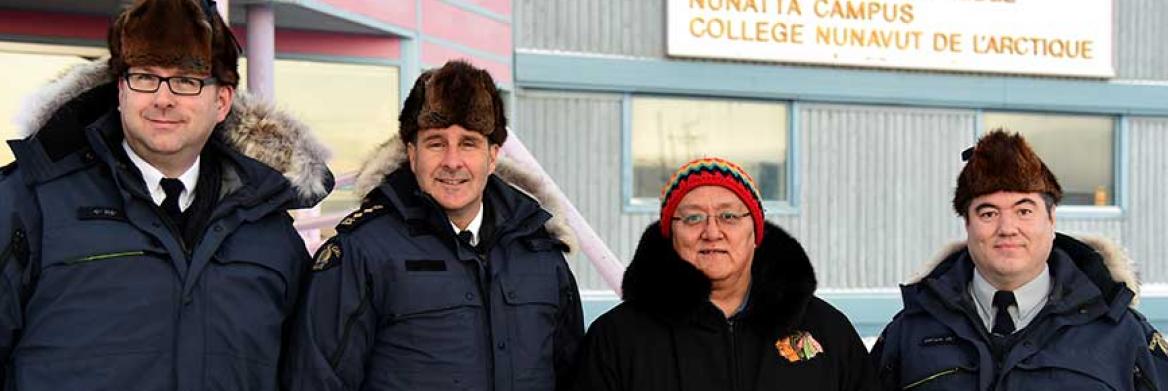It's been eight years since the RCMP hired an Inuit officer, and C/Supt. Michael Jeffrey, commanding officer (CO) of Nunavut RCMP, intends to change that.
Over 80 per cent of the Nunavut population is Inuit, but less than 10 per cent of the police force comes from that community. This inconsistency didn't sit right with Jeffrey, which is why he proposed the Inuit Cadet Development Program.
"We want to be representative of the communities we police," emphasizes Jeffrey, indicating the main policing barriers in Nunavut are language and culture. "It would be preferable to have Inuktitut-speaking officers, when most of the population speaks that as their first language. And coming from the community, there is a better understanding of their belief system, their way of life, their family systems and how they deal with problems and family issues."
Drumming up interest
The eight-month program, slated to start in September 2016 at Arctic College in Iqaluit, is aimed at Nunavut high school graduates interested in a career with the RCMP. It will teach basic policing skills and courses in order to help students pass their police college exam.
"There are not many students who graduate high school in Nunavut," says Inuit RCMP Cst. Henry Coman, citing a 25 per cent graduation rate. "So when some students do graduate, everyone's fighting over them."
Comparable issues exist in other northern territories, where low graduation rates and other jobs lead graduates away from law-enforcement careers. To help remedy this problem, Jeffrey enlisted the help of Sgt. Merle Carpenter to bring the program to life.
Director of the RCMP's Professional Development Centre for Aboriginal Policing, Carpenter has set up similar recruitment programs in other provinces. For the last several years, Carpenter's goal has been to drum up interest in the RCMP among First Nations, Métis and Inuit youth.
"Every community across the country honours and respects the RCMP, and it's tenfold when they see one of their own wearing the uniform," says Carpenter.
Together, Jeffrey and Carpenter put together the Inuit Cadet Development Program to bridge youth into jobs with the RCMP and beyond. Though the RCMP does have some success recruiting Inuit members, many of them don't make it through Depot because they aren't ready for the lifestyle and the intensity of training.
"This will help people who are interested but maybe just not ready yet," says Jeffrey. "It will train them in report writing and English, driving skills, how to handle money, along with integrating them with detachment members."
The program pairs applicants with one of 11 Inuit mentors from the RCMP's ranks in Nunavut. They provide support and offer a taste of what it's like to be a police officer working in the North.
"We want them to get a better understanding about what it really means to be a police officer in the North," says Jeffrey.
The Nicola Valley Institute of Technology in B.C. is collaborating with Arctic College to build the curriculum and will accept 10 to 15 students for its first year. M Division (Yukon) now wants to set up a similar recruitment program.
Alternative destinations
Not everyone who completes the program will go on to be an RCMP officer. But those who complete their studies will be more equipped to enter the workforce — whether as part of the RCMP or elsewhere.
The program has partnered with different agencies across the territory that could employ those graduates who don't end up pursuing work with the RCMP, including the Canadian Border Services Agency and Parks Canada.
"If the program is not successful at recruiting RCMP members, we shouldn't look at it as a failure," says Jeffrey. "We'll be able to transition those people into territorial or other federal jobs."
The program has sparked some interest already. Coman says inquiries have come in across the territory from people asking how they can apply.
Reprinted with permission from the Pony Express ().
